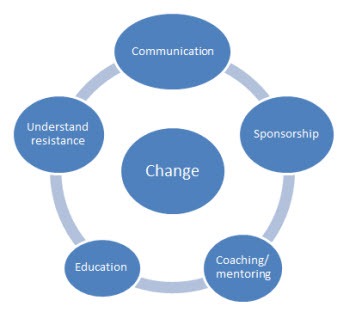Re: Walmart Health: Just had a great dental visit this morning, which was preceded by helpful reminders from Epic, and…
Bowtie Confidential: 5 Steps to Managing Change in Healthcare 4/15/12
It’s interesting. When one mentions the word “change,” it puts the listener on the defensive. If you use the words “modify,” “improve” or “alter,” it does not create the same stress level. Perhaps we should call change management “improvement management.”
Nevertheless, change is paramount in healthcare right now, and managing it is not easy. I have found that there are five areas of focus for successful change management: communication, sponsorship, coaching, education, and understanding resistance.
1. Communication is important because it mitigates surprise, which is very stressful. To communicate well, healthcare leaders and project managers should create a communication plan with milestones and a timeline. Many of our clients have been successful using tools such as town hall sessions, newsletters, e-mails, social media, etc.
2. Sponsorship is a critical change management tool. If there is not strong leadership behind the change, resistance will keep it from happening. Sponsorship for change begins at the highest leadership level. It is imperative that as management, we become positive change agents so that our staff members receive the direction that they need.
3. Coaching provides hands-on help to move from A to B. As management/change agents, we are de facto coaches. It is effective to have senior leadership coach management, who can then coach their staff members. These activities build trust and acceptance of change, predominantly because they facilitate the behavior change.
4. Education is similar to coaching, but does not have to be 1:1. It builds knowledge and ability, which are antidotes to resistance. While it is important to provide functional knowledge transfer, it is also important to talk about change management coping techniques. For example, it is important to let staff know the reason that the change is happening and what is in it for them.
5. Understanding resistance helps deflect the defensiveness around change, which facilitates moving ahead. Understand why there will be resistance. People are used to doing their job one way and are concerned about how the change will impact their work and their experience of work. Planning is an important component to change management. When people know ahead of time (again, try to eliminate any surprises), there will be less resistance than if it is forced into place in a hurry. Bring on the naysayers and ask them to be part of the process. Their point of view will be helpful in planning and design. Also, develop appropriate committees and messengers that can communicate to the organization at different and varying levels.
The goal is to become an organization in which change is OK. These five components should be part of any change and should be an everyday theme for the organization. This will build trust and will take time. Yet as trust is established and change is experienced as making things better, more people will become change agents. A healthcare organization’s ability to flex and adapt to change will become a competitive advantage as well.
Rob Drewniak is vice president, strategic and advisory services, for Hayes Management Consulting.


